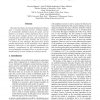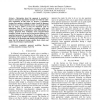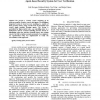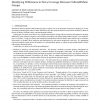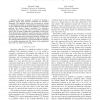91
Voted
IAT
2009
IEEE
15 years 5 months ago
2009
IEEE
This paper investigates incremental multiagent learning in static or evolving structured networks. Learning examples are incrementally distributed among the agents, and the object...
123
Voted
IAT
2009
IEEE
15 years 5 months ago
2009
IEEE
Recently, multi-attribute negotiation has been extensively studied from a game-theoretic viewpoint. Since normal and extensive form games have the drawback of requiring an explicit...
91
Voted
IAT
2009
IEEE
15 years 5 months ago
2009
IEEE
This paper addresses a novel coordination problem for distributed agents in a discrete-event setting. We introduce and study a predicate coordination problem as the problem of dist...
108
Voted
IAT
2009
IEEE
15 years 5 months ago
2009
IEEE
Information about the opponent is essential to improve automated negotiation strategies for bilateral multiissue negotiation. In this paper we propose a negotiation strategy that e...
IAT
2009
IEEE
15 years 8 months ago
2009
IEEE
106
Voted
IAT
2009
IEEE
15 years 8 months ago
2009
IEEE
—We present a security system consisting of an arbitrary number of entries, sensors and agents. The intelligent integrated system is based on user modeling, i.e. models of their ...
71
Voted
IAT
2009
IEEE
15 years 8 months ago
2009
IEEE
96
Voted
IAT
2009
IEEE
15 years 8 months ago
2009
IEEE
In this paper, we present a new approach, called SATIS (Semantically AnnotaTed Intentions for Services), relying on semantic web technologies and models, to assist collaboration a...
127
Voted
IAT
2009
IEEE
15 years 8 months ago
2009
IEEE
—This paper proposes a method of learning a similarity matrix from pairwise constraints for interactive clustering. The similarity matrix can be learned by solving an optimizatio...
101
Voted
IAT
2009
IEEE
15 years 8 months ago
2009
IEEE
—Commitments based on branching time logic are powerful representations for modeling multi-agent interactions. Current approaches into commitments have conceived these representa...
